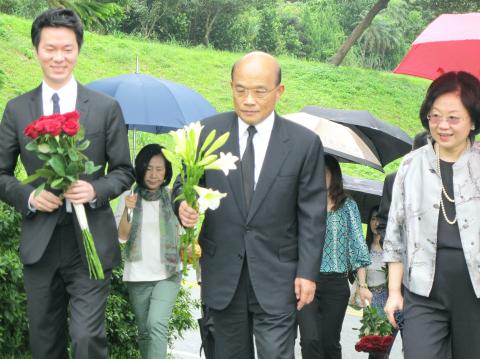|
Group bids to foster
democracy with Lu Hsiu-yi’s mementos
By Lee Hsin-fang and Jake Chung / Staff reporter, with staff
writer

Democratic Progressive Party (DPP)
Chairman Su Tseng-chang, center, accompanied by late DPP legislator Lu Hsiu-yi’s
widow, Tchen Yu-hsiu, right, and Lu’s son, left, presents flowers at Lu’s tomb
in New Taipei City yesterday to commemorate the 15th anniversary of his death.
Photo: Yu Chao-fu, Taipei Times
The Egretfind Foundation intends to donate
mementos related to former legislator Lu Hsiu-yi (盧修一) to the Academia Historica
tomorrow.
Lu was a highly respected Democratic Progressive Party (DPP) legislator from
when he started serving in 1990 until he succumbed to lung cancer on Aug. 6,
1998, at the age of 57. He was noted for advocating democracy in Taiwan.
Lu’s death was a heavy blow to members of the then-fledgling DPP, and his ideals
and broad circle of friends in the party mean he is fondly remembered by many
party members, Tchen Yu-hsiu (陳郁秀), Lu’s wife and former chairperson of the
council of cultural affairs, said in an article yesterday marking the 15th
anniversary of Lu’s passing.
“Hsiu-yi played a big part in making Taiwan more democratic and became one of
the first-term legislators in 1989. He retained a social conscience though he
was one of the few lucky enough to be well-educated,” Tchen said, adding that Lu
had also started the process of creating a Taiwan-centric political system.
The first-term legislators were all elected in China in May 1948, prior to the
relocation of the Chinese Nationalist Party (KMT) government to Taiwan. Due to
the Temporary Provisions Effective During the Period of Communist Rebellion
(動員戡亂時期臨時條款), many first-term legislators continued in their roles despite the
official termination of their positions in May 1951. Instead of holding
elections for all legislators, the government held just six to elect
replacements for those who had passed away.
Lu was an advocate of democracy and also a skilled statesman, Tchen said, adding
that he had left behind many historically valuable mementos.
During the past 15 years, the foundation has organized Lu’s letters, diaries and
other documentation from his time in the Legislative Yuan, Tchen said.
“We hope this can help preserve the history of Taiwan’s struggle for democracy,”
Tchen said, adding that the foundation also hoped that the donation to Academia
Historica could inspire the government and the public to place more importance
on preserving the nation’s culture and history.
The foundation is to donate all of Lu’s personal correspondence and notes to
Academia Historica at the Regent Hotel Taipei at 2pm.
Meanwhile, DPP Chairman Su Tseng-chang (蘇貞昌) yesterday visited Lu’s grave at the
ChinPaoSan Cemetery.
DPP sources say that Su and Lu’s paths crossed in 1997 when Su represented the
party in a poll for Pingtung County commissioner.
Lu had been the party’s first choice for the post and Su ended up representing
Taipei County in the legislature after losing the election at Pingtung when he
attempted to run for a second term as commissioner, the sources said.
Su reporterdly told Lu: “If it suits you, you run for county commissioner and
I’ll be your executive officer for the campaign,” the sources said, adding that
Lu had not represented the party because he fell ill.
Lu backing Su in the 1997 county commissioner elections — where he actually
kneeled down and asked voters to support Su — sealed the two DPP heavyweight’s
friendship the source said, adding that Su had always been grateful to Lu for
his support.
|
![]()
![]()
![]()